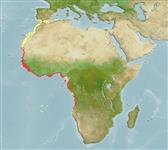Preferred temperature (Ref.
115969): 18.5 - 28, mean 25.2 (based on 140 cells).
Phylogenetic diversity index (Ref.
82804): PD
50 = 0.5156 [Uniqueness, from 0.5 = low to 2.0 = high].
Bayesian length-weight: a=0.01202 (0.00993 - 0.01455), b=3.04 (3.01 - 3.07), in cm Total Length, based on LWR estimates for this species (Ref.
93245).
Niveau trophique (Ref.
69278): 4.0 ±0.51 se; based on food items.
Résilience (Ref.
120179): Milieu, temps minimum de doublement de population : 1,4 à 4,4 années (K=0.18-0.53; tm=1; tmax=7; Fec=60,200).
Prior r = 0.82, 95% CL = 0.54 - 1.23, Based on 2 stock assessments.
Fishing Vulnerability (Ref.
59153): Moderate to high vulnerability (49 of 100).
Climate Vulnerability (Ref.
125649): Low to moderate vulnerability (26 of 100).
